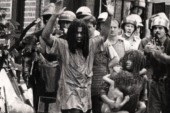
“Midnight’s Children”
Salman Rushdie’s magic-realist epic about 20th-century India, Midnight’s Children, is usually compared to Günter Grass’s The Tin Drum and Gabriel GarcÃa Márquez’s One Hundred Years of Solitude, but it’s more like Robert Zemeckis’s Forrest Gump. Both are surface-skimming accounts of major historical events told from the perspective of enchanted innocents, and both are full to bursting with folksy whimsy.
The book was, and is, hugely admired in some circles — it won the Booker Prize in 1981, the Booker of Bookers in 1993 and, in a moment of astounding overkill, the Best of the Booker in 2008 — but I found myself struggling to finish it. Instead of illuminating the past, it uses the past as mere backdrop for wacky tall tales and an endless parade of outsized characters: a 512-year-old prostitute who can alter her own odour, an aunt who can stir curses into her cooking, a political leader whose voice induces erections, etc. And those names! Rani of Cooch Naheen, Wee Willie Winkie, Nussie-the-Duck — they’re like tinfoil between your molars.
The central story is that of cucumber-nosed Saleem Sinai, born at the stroke of midnight on August 15, 1947, the exact moment of India’s independence from Britain. Due to the momentousness of his timing and the enormity of his proboscis, Saleem develops powers of telepathy, which he uses to read minds and communicate with the thousand other Indian children born in that first hour — children with strange abilities of their own.
Actually, Midnight’s Children purports to tell that story but never really does. Rushdie spends a good 200 pages getting to it, then all but turfs it soon after; it’s just an excuse to link his semi-autobiographical protagonist to the tides of history, and an anchor for a profusion of quirky stories related to Saleem’s extended family. I don’t fault the book for being stuffed with characters and events, but I do fault it for being empty of human beings and for trivializing the past. All the characters are cartoons, and even the most tragic of episodes — the war with Pakistan; a 1965 bombing in Rawalpindi; Indira Gandhi’s suspension of civil liberties — are related in a weightless, almost patronizing style. Saleem isn’t affected by anything except on the most superficial level, and consequently neither are we. The book is a piffling mock epic.
Still, it’s hard to deny Rushdie’s ambition and his enormous skill as a spinner of stories; even if you’re turned off by the book, you have to admit it’s some sort of feat. The same cannot be said of Canadian director Deepa Mehta’s new film version, which is mostly just dull, dull, dull. It was Mehta who approached Rushdie about adapting the book, and he must have thought it a good idea — not only did he consent, he sold her the rights for a dollar, wrote the screenplay himself, and took on the role of narrator. But aside from the fact Mehta is of Indian descent, it’s hard to imagine anyone less suited to the material.
Where Rushdie is playful and a born fabulist, Mehta (Water, The Republic of Love) is earnest and restrained, often to the point of tedium. In collaboration with Rushdie, she’s retained much of the book’s narrative line while eliminating a good deal of the “magical” content, and the few fanciful bits that remain are risibly uninspired. The scene in which all of the Midnight’s Children gather inside Saleem’s head for a “conference” is as un-magical as moviemaking gets, amounting to a bunch of extras in a room reading lines at one another. As for the more realistic material, it’s just garden-variety historical pageantry, way too much of which has been crammed into the two-and-a-half-hour running time. The production notes proudly proclaim 127 speaking parts, which would be more of a feat if any of them actually made an impression.
The only upside of Mehta’s involvement is that her drabness and literal-mindedness cancels out many of Rushdie’s most irksome tendencies: there’s a lot less whimsy, a lot less narrative for narrative’s sake. And to Mehta’s credit, she scrubs away all traces of Rushdie’s horror of older women. All the book’s female characters, even the ones who start out life demure and lovely, grow up to be resentful scolds or irrational harridans, with pendulous breasts, hairy forearms, and moles like “witches tits.” (You could call the book misogynist, but Rushdie reduces all the characters to comic grotesques, and the women are at least more memorable than the many impotent, ineffectual men.) Unfortunately, Mehta doesn’t rethink the older women characters, she just tamps them down and makes them as boring as everyone else.
People always talk about film adaptations not living up to the book, but while it’s true great books rarely make great movies, it’s also true that the act of adapting a book can reveal the deficiencies in the source material. Though the film of Midnight’s Children is decidedly inferior to the original, its complete absence of style allows you to see what Rushdie’s surplus of style was covering up: a rambling, shallow picaresque with little worth saying about humanity or history.
____
Scott MacDonald writes about cinema for Toronto Standard. You can follow him on Twitter at @scottpmac. He just started tweeting, so be gentle with him.
For more, follow us on Twitter @TorontoStandard and subscribe to our newsletter.














